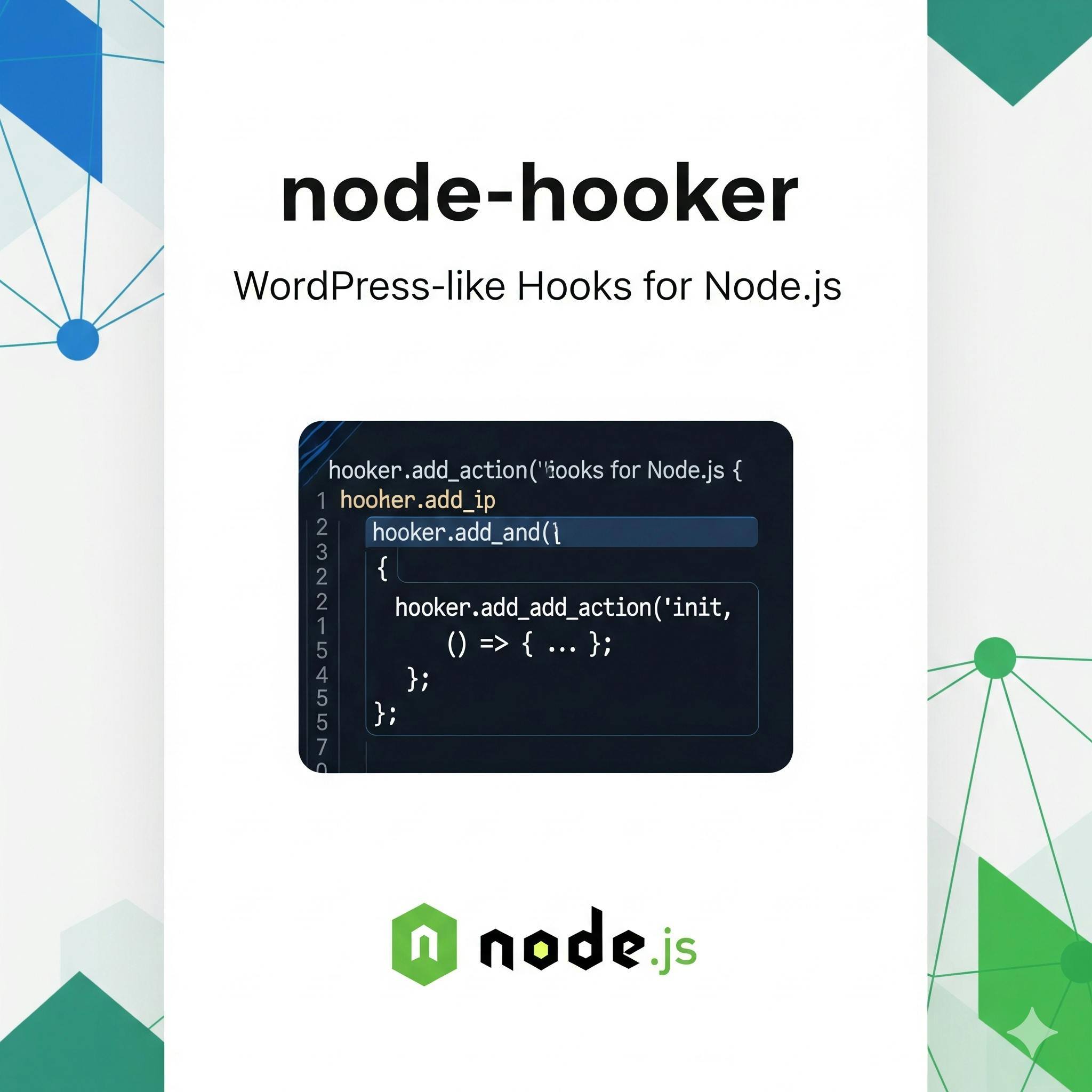If you've ever built a large Node.js application, you've probably felt the pain of tightly-coupled code. As features grow, modules become a tangled mess of direct function calls. Modifying one part of the system often creates a cascade of bugs in another. It’s a maintenance nightmare.
For years, I've admired the elegant solution used by the WordPress community: the Hooks system. It’s a simple yet incredibly powerful pattern of Actions and Filters that allows for a level of decoupling and extensibility that is the envy of many ecosystems.
I wanted that power in my Node.js projects. So, I built node-hooker.
node-hooker is a zero-dependency, open-source library that faithfully implements the WordPress Hooks API, allowing you to build applications with a clean, extensible, plugin-like architecture.
What's the Big Deal About Hooks?
Instead of having your modules call each other directly, they can communicate through a central dispatcher.
- Actions are like announcements. A piece of your code can say, "Hey,
user_just_logged_in!" without needing to know or care who is listening. Other modules can then "hook" into that announcement to perform tasks, like sending an email or logging analytics. - Filters are chainable modifications. A function can pass a piece of data (like a string or an object) into a filter, and other hooked functions can modify that data in sequence before it's returned.
This pattern is the secret sauce behind the vast WordPress plugin ecosystem, and it’s a game-changer for writing maintainable code.
Introducing node-hooker
node-hooker brings this entire battle-tested system to Node.js (and the browser!) with a familiar API.
Key Features:
- Full API Parity: All the functions you know from WordPress are here:
add_action,do_action,apply_filters,remove_action,did_action, etc. - Zero Dependencies: It's a tiny, focused library that won't bloat your
node_modules. - Browser Support: A UMD bundle is included, so you can use the exact same event system on the client-side.
- Clean Architecture: Build modular systems where components are truly independent.
Show Me the Code
Let's look at a practical example. Imagine you have a user registration function that needs to trigger several unrelated actions.
Before node-hooker (The Tangled Mess):
// user.js
import { sendWelcomeEmail } from './email';
import { addToCRM } from './crm';
import { logAnalytics } from './analytics';
function registerUser(userData) {
// ... save user to database ...
// Now, call everything directly
sendWelcomeEmail(userData.email);
addToCRM(userData);
logAnalytics('new_user_signup');
return true;
}
This is fragile. What if you want to add another action? You have to modify the core registerUser function every single time.
After node-hooker (Clean and Decoupled):
// user.js
import hooker from 'node-hooker';
function registerUser(userData) {
// ... save user to database ...
// Just announce that a user has been created.
hooker.do_action('user_registered', userData);
return true;
}
// --- In other files, completely separate from user.js ---
// email.js
import hooker from 'node-hooker';
hooker.add_action('user_registered', (userData) => {
// send welcome email...
});
// crm.js
import hooker from 'node-hooker';
hooker.add_action('user_registered', (userData) => {
// add user to CRM...
});
Now, the user.js module has no idea that emails or CRMs even exist. You can add, remove, or change listeners for the user_registered event without ever touching the original function. That's the power of decoupling.
Give It a Try
I built node-hooker to solve a problem I was facing, and I hope it can help other developers write cleaner, more maintainable code. The project is fully open-source and available on npm.
I'd love for you to check it out, read the documentation, and maybe even give it a star on GitHub if you find it useful.
- GitHub Repository: https://github.com/mamedul/node-hooker
- NPM Package: https://www.npmjs.com/package/node-hooker
Thanks for reading!


